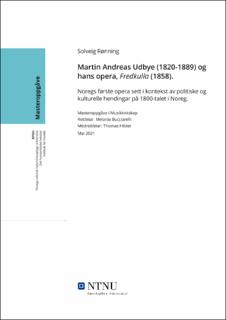| dc.contributor.advisor | Bucciarelli, Melania | |
| dc.contributor.advisor | Hilder, Thomas | |
| dc.contributor.author | Rønning, Solveig | |
| dc.date.accessioned | 2021-09-24T18:26:22Z | |
| dc.date.available | 2021-09-24T18:26:22Z | |
| dc.date.issued | 2021 | |
| dc.identifier | no.ntnu:inspera:82258556:9592232 | |
| dc.identifier.uri | https://hdl.handle.net/11250/2781800 | |
| dc.description.abstract | Denne masteroppgåva handlar om komponisten Martin Andreas Udbye (1820-1889) og hans opera Fredkulla (1858), som er den aller første norske operaen. Sidan både Udbye og Fredkulla er ukjend for mange, vil eg gjennom oppgåva presentere funn frå både arkivmateriale og tilgjengeleg litteratur, på ein måte som er tilgjengeleg for fleire.
Oppgåva sitt hovudfokus er å setje Fredkulla inn i ein større kontekst, der 1800-talets politikk og kultur er i fokus. Operaen vart skrive på midten av eit århundre som såg byrjinga og veksten på nasjonalromantikken, og tida var prega av eit fokus på å finne noko eige norsk i ei periode der Noreg var i union med Sverige. Forholdet mellom norske myndigheiter og den svenske kongen, som tidvis var prega av store spenningar, vart spegla i den norske befolkninga, som hadde delte meiningar om unionen. Tankar om nasjonalisme og skandinavismen, som hadde ideen om eit foreina Skandinavia i fokus, påverka studentar, forfattarar, kunstarar og musikarar i hovudstaden, som gjennom dei fann desse tema veg inn i songar og tekstar.
Dette er konteksten Fredkulla vart til i. Oppgåva ser på korleis ein opera som er sett til år 1101 deler likskapar med året 1858, og om dei politiske ideane på 1800-talet påverka Fredkulla, og korleis dette er presentert. Sentralt i studien er kornummera i operaen, der folket framfører eksplisitte politiske idear, i tråd med tankane på den tida, sjølv om ikkje alle var einige med dei. Dette knytt operaen til student- og mannskortradisjonen i Noreg, som Udbye sjølv var ein stor del av som komponist. | |
| dc.description.abstract | This dissertation is about the composer Martin Andreas Udbye (1820-1889) and his opera Fredkulla (1858), which is the very first Norwegian opera. As both Udbye and Fredkulla are unknown to many, one goal for this dissertation is to present findings from both archives and available literature, in a way that is accessible to many.
The primary focus of the dissertation is to place Fredkulla in a larger context, where the politics and culture of the 19th century are in focus. The opera was written in the middle of a century which saw the emergence of national romanticism, and a focus on finding something specifically Norwegian at a time when Norway was in a union with Sweden. The sometime tenuous relationship between the Norwegian government and the Swedish king, was reflected in the Norwegian public, who had differing opinions on the union. Thoughts on nationalism and the scandinavistic movement, which had the idea of a unified Scandinavia as its focus, influenced students, writers, artists and musicians in Norway’s capital, and through them these topics found their way into songs and writing.
This is the context in which Fredkulla came to be. The dissertation looks at how an opera set in the year 1101 shares some similarities with the year 1858, and whether the political ideas of the 19th century influenced Fredkulla in any way, and how this is presented. Essential to this study are the chorus numbers in the opera, in which the people perform explicitly political ideas, in line with the ideas at the time, though not everyone agreed with them. This relates to the student chorus and male-chorus tradition in Norway, that Udbye himself was very much a part of as a composer. | |
| dc.language | nno | |
| dc.publisher | NTNU | |
| dc.title | Martin Andreas Udbye (1820-1889) og hans opera, Fredkulla (1858).
Noregs første opera sett i kontekst av politiske og kulturelle hendingar på 1800-talet i Noreg. | |
| dc.type | Master thesis | |
